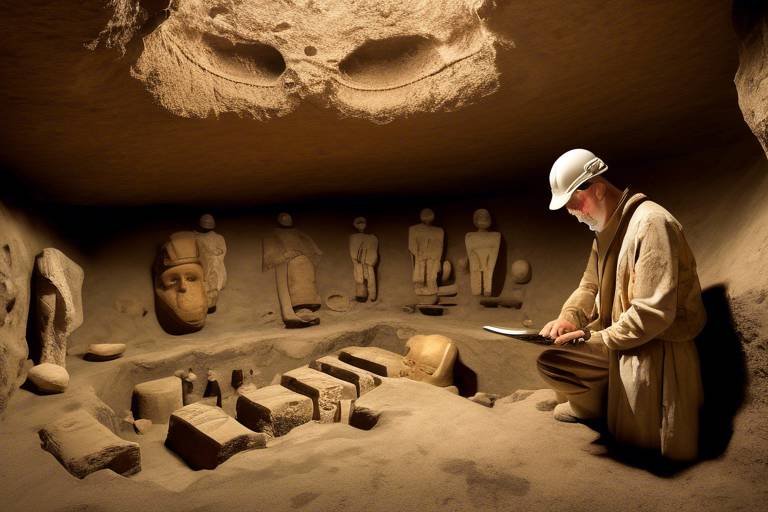How Ancient Civilizations Developed Their Legal Systems
Legal systems in ancient civilizations were not built in a day. They evolved over centuries, shaped by a myriad of influences and factors that reflected the values and norms of the societies they served. From the earliest known legal codes to the establishment of legal institutions and the development of case law, the journey of legal systems in ancient times was a fascinating tapestry of tradition, innovation, and adaptation.

Early Legal Codes
Exploring the origins and evolution of legal systems in ancient civilizations, shedding light on the key factors and influences that shaped early forms of law and justice.
When delving into the roots of legal systems, we encounter the fascinating world of early legal codes established by ancient civilizations. One of the most renowned legal codes is the Code of Hammurabi in Mesopotamia, dating back to around 1754 BC. This code, inscribed on a stele, contained detailed laws and punishments for various offenses, reflecting the societal norms and values of the time. Similarly, the Twelve Tables in Rome, created around 450 BC, provided a foundation for Roman law, addressing issues like property rights, debt, and family matters.

Role of Religion and Morality
When delving into the development of legal systems in ancient civilizations, it becomes evident that the role of religion and morality played a crucial part in shaping early forms of law and justice. Ancient societies often intertwined their religious beliefs and moral values with their legal systems, creating a complex web of influence that governed the behavior and interactions of individuals.
Religion, with its divine laws and ethical teachings, provided a foundation for many legal principles in ancient civilizations. The concept of divine justice, where actions were believed to be judged by higher powers, instilled a sense of accountability and deterrence against wrongdoing. For example, in ancient Egypt, the concept of Ma'at, representing truth, balance, and order, heavily influenced the legal and moral codes of the society.
Morality, on the other hand, served as a societal compass guiding individuals on right and wrong behavior. Moral values such as honesty, integrity, and respect for others were often integrated into legal codes to maintain social harmony and cohesion. Punishments for offenses were not only seen as retribution but also as a means to uphold moral standards within the community.
Moreover, religious institutions and figures often held significant power in legal matters, acting as mediators, judges, or lawmakers in resolving disputes and interpreting laws based on religious texts. In ancient Mesopotamia, the king was not only a political leader but also considered the intermediary between the gods and the people, with his judgments carrying divine authority.
Overall, the intertwining of religion and morality with legal systems in ancient civilizations created a unique framework where spiritual beliefs and ethical standards influenced laws and governance, shaping the course of justice and societal order.

Legal Institutions and Procedures
Exploring the origins and evolution of legal systems in ancient civilizations, shedding light on the key factors and influences that shaped early forms of law and justice.
Legal institutions and procedures in ancient civilizations played a crucial role in maintaining order and resolving disputes. These structures were essential for upholding the rule of law and ensuring justice prevailed in society.
Ancient legal systems often featured specialized institutions dedicated to handling legal matters. Courts served as the central hubs where disputes were brought forth, evidence was presented, and judgments were rendered. Judges, appointed based on their knowledge and wisdom, presided over these courts and deliberated on cases with fairness and impartiality.
Moreover, legal procedures in ancient civilizations were meticulously designed to ensure a systematic approach to resolving conflicts. Formalized methods of dispute resolution, such as arbitration and mediation, were employed to reach settlements amicably. These procedures aimed to maintain social harmony and prevent conflicts from escalating into chaos.
Additionally, legal institutions in ancient societies also provided avenues for individuals to seek redress for grievances and injustices. Access to justice was considered a fundamental right, and mechanisms were in place to address the concerns of both the powerful and the marginalized members of society.
Overall, the legal institutions and procedures of ancient civilizations laid the foundation for the development of structured legal systems that continue to influence contemporary notions of justice and governance.
To provide further clarity on the topic, here are some frequently asked questions about the development of legal systems in ancient civilizations:
- Q: How did ancient legal systems differ from modern legal systems?
- A: Ancient legal systems were often based on customary laws and traditions, whereas modern legal systems are more codified and systematic in nature.
- Q: What role did rulers play in shaping legal institutions in ancient civilizations?
- A: Rulers often had a significant influence on the establishment and functioning of legal institutions, as laws were sometimes tailored to maintain their authority and control over society.
- Q: Were legal proceedings in ancient civilizations open to public scrutiny? A: Legal proceedings in ancient civilizations were typically public, allowing citizens to witness the administration of justice and ensuring transparency in decision-making processes.

Penalties and Punishments
Exploring the origins and evolution of legal systems in ancient civilizations, shedding light on the key factors and influences that shaped early forms of law and justice.
Penalties and punishments in ancient legal systems were often severe and aimed at maintaining order and enforcing societal norms. In civilizations like Mesopotamia and Rome, a variety of punishments were prescribed for different offenses, reflecting the values and beliefs of the time.
In Mesopotamia, under the Code of Hammurabi, punishments were often based on the principle of "an eye for an eye." This meant that the severity of the punishment corresponded to the nature of the offense committed. For instance, theft could result in the offender losing a hand, while murder could lead to the death penalty.
Similarly, in ancient Rome, the Twelve Tables established a set of laws that outlined specific penalties for various crimes. Punishments ranged from fines and public shaming to exile and even death. The legal system aimed to deter criminal behavior and uphold the values of Roman society.
Moreover, punishments in ancient legal systems were not only punitive but also served as a form of retribution and deterrence. By imposing harsh penalties, authorities sought to discourage individuals from engaging in unlawful activities and maintain social order.
Furthermore, the application of penalties and punishments was often carried out through established legal procedures, ensuring that justice was administered fairly and in accordance with the prevailing laws. Courts and judges played a crucial role in determining guilt or innocence and meting out appropriate punishments.
In conclusion, the penalties and punishments in ancient legal systems reflected the values, beliefs, and societal norms of their respective civilizations. They served as a means of maintaining order, upholding justice, and preserving the fabric of society through a system of consequences for unlawful behavior.
Stay tuned for answers to common questions about ancient legal systems, their impact on modern law, and more!

Legal Precedents and Case Law
Legal precedents and case law played a crucial role in shaping the legal systems of ancient civilizations. When a ruling was made in a particular case, it set a precedent that could be used as a reference for future similar cases. This concept of looking back at past decisions to guide present judgments laid the foundation for the development of case law.
Ancient societies recognized the importance of consistency and fairness in legal decisions, which led to the establishment of precedents. These legal precedents provided a framework for judges to follow, ensuring uniformity in the application of laws across different cases. By building upon past rulings, the legal system evolved and adapted to changing societal norms and values.
One notable example of legal precedents can be found in the Roman legal system, where the decisions of experienced judges were documented and used as guidelines for resolving future disputes. This practice of referring to previous cases helped maintain stability and predictability in legal outcomes.
Moreover, the development of case law in ancient civilizations contributed to the growth of legal expertise and professionalism. Legal professionals, such as jurists and advocates, relied on established precedents to argue their cases effectively and uphold the principles of justice.
In essence, legal precedents and case law served as the building blocks of ancient legal systems, shaping the way laws were interpreted and applied. By studying past judgments and drawing upon established principles, societies were able to establish a sense of continuity and coherence in their legal frameworks.

Legal Rights and Responsibilities
In ancient legal systems, individuals were bound by a set of rights and responsibilities that governed their interactions within society. These frameworks outlined the privileges and obligations that individuals held, shaping the dynamics of the community. Property rights were a fundamental aspect of legal systems, delineating ownership and usage of land, resources, and possessions. Contracts, although simpler in form compared to modern agreements, carried significant weight in ancient societies, enforcing obligations between parties.
Moreover, individuals had responsibilities towards the community, contributing to the collective welfare and upholding societal norms. Upholding justice and fairness was not solely the duty of legal institutions but also fell upon the citizens to ensure harmony and order. These responsibilities extended beyond personal interests, emphasizing the interconnectedness of individuals within the social fabric.
Legal systems in ancient civilizations often reflected the values and priorities of the society, balancing individual rights with communal well-being. The concept of legal rights and responsibilities was intricately linked to the broader cultural and ethical framework, guiding behavior and interactions among members of the community. Understanding and respecting these legal principles were essential for maintaining social cohesion and stability.

Legal Education and Profession
Legal education and the practice of law in ancient civilizations were integral to the functioning of legal systems and the administration of justice. In societies like ancient Rome and Greece, legal professionals played crucial roles in advising rulers, interpreting laws, and representing individuals in legal matters. The training of legal experts often involved rigorous study and apprenticeship under experienced practitioners, emphasizing the importance of knowledge and expertise in legal matters.
Legal professionals in ancient civilizations, such as lawyers, scribes, and advisors to rulers and judges, were highly respected for their understanding of laws and their ability to navigate complex legal issues. These individuals were instrumental in upholding the rule of law and ensuring fair and impartial resolution of disputes within the society. Their roles extended beyond mere interpretation of laws to actively shaping legal frameworks and contributing to the development of legal principles.
Moreover, legal education in ancient times encompassed not only the study of existing laws and legal procedures but also broader aspects of ethics, rhetoric, and governance. Legal professionals were expected to possess a deep understanding of moral principles and societal norms, enabling them to apply laws in a just and equitable manner. The profession of law was viewed as a noble pursuit that required dedication, integrity, and a commitment to upholding justice.
As legal systems evolved in ancient civilizations, the demand for skilled legal professionals grew, leading to the establishment of specialized institutions for legal education and training. These institutions served as centers of learning where aspiring lawyers and judges could acquire the necessary knowledge and skills to practice law effectively. The transmission of legal knowledge through formal education laid the foundation for the development of legal expertise and professionalism in ancient societies.
Overall, legal education and the practice of law in ancient civilizations played a pivotal role in shaping the legal landscape and ensuring the proper functioning of judicial systems. The legacy of ancient legal professionals continues to influence modern legal practices, underscoring the enduring importance of legal education and professionalism in upholding the principles of justice and equity.

Legacy of Ancient Legal Systems
When delving into the legacy of ancient legal systems, we uncover a rich tapestry of influence that continues to shape modern legal frameworks. The foundations laid by civilizations long past have left an indelible mark on how we perceive justice and law today. Through the intricate web of historical developments, we can draw parallels between the legal principles of antiquity and contemporary legal practices.
Ancient legal systems, with their emphasis on codes of conduct and prescribed penalties, set the stage for the evolution of legal norms. The enduring impact of early legal codes, such as the Code of Hammurabi and the Twelve Tables, resonates through the corridors of time, guiding our understanding of justice and accountability.
Moreover, the role of legal precedents and case law in ancient societies laid the groundwork for the establishment of legal principles based on past decisions. The concept of precedent, rooted in the idea of consistency and fairness, continues to be a cornerstone of modern legal systems, ensuring a degree of predictability and uniformity in judicial rulings.
One cannot overlook the profound influence of ancient legal institutions and procedures on the development of legal systems. The establishment of courts, judges, and methods of dispute resolution in antiquity paved the way for the structured administration of justice that we see today. The legacy of these institutions endures in the form of judicial systems that uphold the rule of law and due process.
Furthermore, the rights and responsibilities enshrined in ancient legal frameworks continue to inform contemporary notions of individual liberties and obligations. Concepts such as property rights, contractual agreements, and civic duties, rooted in the legal traditions of the past, shape our understanding of legal relationships and societal harmony.
As we reflect on the legacy of ancient legal systems, we are reminded of the enduring relevance of the past in shaping the present. The echoes of bygone legal practices resonate in our modern laws and institutions, serving as a testament to the enduring power of legal traditions across civilizations.
Frequently Asked Questions
- What were the key legal codes of ancient civilizations?
Ancient civilizations like Mesopotamia and Rome had notable legal codes such as the Code of Hammurabi and the Twelve Tables, respectively. These codes laid down rules and penalties for various offenses, providing insights into the societal norms and values of the time.
- How did religion influence ancient legal systems?
Religious beliefs played a significant role in shaping legal systems in ancient societies. Laws often reflected moral values and principles derived from religious teachings, guiding the behavior and interactions of individuals within the community.
- What were the typical penalties in ancient legal systems?
Ancient legal systems prescribed a range of penalties and punishments for different crimes, including fines, corporal punishment, and even death in severe cases. These penalties aimed to maintain order and uphold the societal structure of the time.
- How did legal education function in ancient civilizations?
In ancient civilizations, legal education was often imparted through apprenticeships and mentorship, with aspiring legal professionals learning from experienced practitioners. Scribes, advisors, and lawyers played crucial roles in providing legal counsel and representation.
- What is the legacy of ancient legal systems on modern law?
Ancient legal systems have had a lasting impact on modern legal principles and practices. Concepts like legal precedents, case law, and the rights and responsibilities of individuals trace their origins back to the legal frameworks of ancient civilizations, shaping the foundation of contemporary legal systems.



















